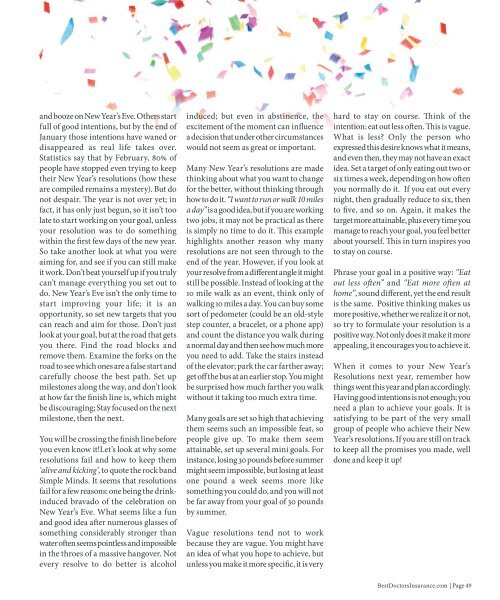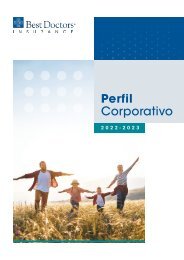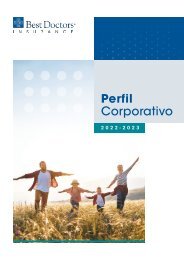BDI-International Magazine - Inaugural Issue
Best Doctors Insurance magazine
Best Doctors Insurance magazine
Create successful ePaper yourself
Turn your PDF publications into a flip-book with our unique Google optimized e-Paper software.
and booze on New Year’s Eve. Others start<br />
full of good intentions, but by the end of<br />
January those intentions have waned or<br />
disappeared as real life takes over.<br />
Statistics say that by February, 80% of<br />
people have stopped even trying to keep<br />
their New Year’s resolutions (how these<br />
are compiled remains a mystery). But do<br />
not despair. The year is not over yet; in<br />
fact, it has only just begun, so it isn’t too<br />
late to start working on your goal, unless<br />
your resolution was to do something<br />
within the first few days of the new year.<br />
So take another look at what you were<br />
aiming for, and see if you can still make<br />
it work. Don’t beat yourself up if you truly<br />
can’t manage everything you set out to<br />
do. New Year’s Eve isn’t the only time to<br />
start improving your life; it is an<br />
opportunity, so set new targets that you<br />
can reach and aim for those. Don’t just<br />
look at your goal, but at the road that gets<br />
you there. Find the road blocks and<br />
remove them. Examine the forks on the<br />
road to see which ones are a false start and<br />
carefully choose the best path. Set up<br />
milestones along the way, and don’t look<br />
at how far the finish line is, which might<br />
be discouraging; Stay focused on the next<br />
milestone, then the next.<br />
You will be crossing the finish line before<br />
you even know it!Let’s look at why some<br />
resolutions fail and how to keep them<br />
‘alive and kicking’, to quote the rock band<br />
Simple Minds. It seems that resolutions<br />
fail for a few reasons: one being the drinkinduced<br />
bravado of the celebration on<br />
New Year’s Eve. What seems like a fun<br />
and good idea after numerous glasses of<br />
something considerably stronger than<br />
water often seems pointless and impossible<br />
in the throes of a massive hangover. Not<br />
every resolve to do better is alcohol<br />
induced; but even in abstinence, the<br />
excitement of the moment can influence<br />
a decision that under other circumstances<br />
would not seem as great or important.<br />
Many New Year’s resolutions are made<br />
thinking about what you want to change<br />
for the better, without thinking through<br />
how to do it. “I want to run or walk 10 miles<br />
a day” is a good idea, but if you are working<br />
two jobs, it may not be practical as there<br />
is simply no time to do it. This example<br />
highlights another reason why many<br />
resolutions are not seen through to the<br />
end of the year. However, if you look at<br />
your resolve from a different angle it might<br />
still be possible. Instead of looking at the<br />
10 mile walk as an event, think only of<br />
walking 10 miles a day. You can buy some<br />
sort of pedometer (could be an old-style<br />
step counter, a bracelet, or a phone app)<br />
and count the distance you walk during<br />
a normal day and then see how much more<br />
you need to add. Take the stairs instead<br />
of the elevator; park the car farther away;<br />
get off the bus at an earlier stop. You might<br />
be surprised how much farther you walk<br />
without it taking too much extra time.<br />
Many goals are set so high that achieving<br />
them seems such an impossible feat, so<br />
people give up. To make them seem<br />
attainable, set up several mini goals. For<br />
instance, losing 30 pounds before summer<br />
might seem impossible, but losing at least<br />
one pound a week seems more like<br />
something you could do, and you will not<br />
be far away from your goal of 30 pounds<br />
by summer.<br />
Vague resolutions tend not to work<br />
because they are vague. You might have<br />
an idea of what you hope to achieve, but<br />
unless you make it more specific, it is very<br />
hard to stay on course. Think of the<br />
intention: eat out less often. This is vague.<br />
What is less? Only the person who<br />
expressed this desire knows what it means,<br />
and even then, they may not have an exact<br />
idea. Set a target of only eating out two or<br />
six times a week, depending on how often<br />
you normally do it. If you eat out every<br />
night, then gradually reduce to six, then<br />
to five, and so on. Again, it makes the<br />
target more attainable, plus every time you<br />
manage to reach your goal, you feel better<br />
about yourself. This in turn inspires you<br />
to stay on course.<br />
Phrase your goal in a positive way: “Eat<br />
out less often” and “Eat more often at<br />
home”, sound different, yet the end result<br />
is the same. Positive thinking makes us<br />
more positive, whether we realize it or not,<br />
so try to formulate your resolution is a<br />
positive way. Not only does it make it more<br />
appealing, it encourages you to achieve it.<br />
When it comes to your New Year’s<br />
Resolutions next year, remember how<br />
things went this year and plan accordingly.<br />
Having good intentions is not enough; you<br />
need a plan to achieve your goals. It is<br />
satisfying to be part of the very small<br />
group of people who achieve their New<br />
Year’s resolutions. If you are still on track<br />
to keep all the promises you made, well<br />
done and keep it up!<br />
BestDoctorsInsurance.com | Page 49
















